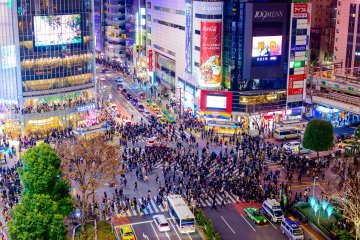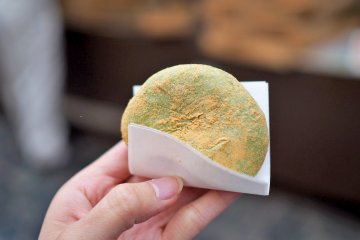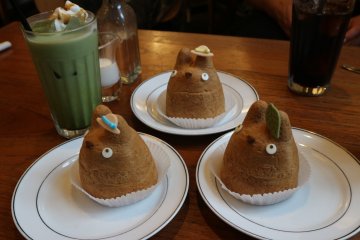

Ogikubo with its rivers, bountiful nature, shotengai and leafy suburban atmosphere (despite being located 15 minutes from Shinjuku), is an urban sanctuary and one deserving of anyone looking for a touch of respite from the urban chaos of deepest, darkest central Tokyo.
One of Ogikubo’s most enduring legacies is that it’s the birthplace of Tokyo ramen. In the late 40s, when Tokyo was still reeling from the aftermath of the war, residents were looking for filling and affordable meals and ramen was, ultimately, the end result. Harukiya, established in 1949, has been a favorite of Ogikubo residents and visitors looking for an authentic taste of Tokyo. The recipe for its soy sauce-style ramen (based on a dried sardine broth which differentiates it from other ramen) hasn’t changed one iota since its inception and a few years ago it opened a sister branch in nearby Kichijoji. It’s a testament to the attention to detail and pride in the local cuisine that makes Harukiya a staple for ramen lovers all over the capital.
Ogikubo's Three Gardens refer to the serene outdoor locations to be found at Otaguro Park, Tekigaiso and Kadokawa Garden. Providing a welcome rest spot for Ogikubo's locals, they have become known as a symbol of the region.
With more than 130 animation companies based in the district of Suginami it will come as no surprise that the Tokyo Polytechnic University Suginami Animation Museum is based in Ogikubo too. A haven for anime geeks and anyone with a passing interest, it provides three floors devoted to everything animation including the history behind it, the major animators in Japanese culture and has an array of interactive activities for children and adults alike.
Ogikubo is a geographical smorgasbord of cultural elements and the locals are proud of its eclecticism and, essentially, it acts as a topographical mirror of enduring Japanese interests such as nature, anime and cuisine. Distinct from its neighbors, Asagaya and Nishi-Ogikubo, Ogikubo is very much its own town and one which revels in its cultural and historical verdancy.
More



















Ogikubo has had an historic and profound relationship with a range of disparate cultural markers such as classical music, literature, ramen and manga for decades. Much like its sibling Nishi-Ogikubo, which sits at the next stop on the Chuo Line, Ogikubo is serene, quiet but with more than enough going on to keep visitors busy on a day or weekend trip.
Ogikubo with its rivers, bountiful nature, shotengai and leafy suburban atmosphere (despite being located 15 minutes from Shinjuku), is an urban sanctuary and one deserving of anyone looking for a touch of respite from the urban chaos of deepest, darkest central Tokyo.
One of Ogikubo’s most enduring legacies is that it’s the birthplace of Tokyo ramen. In the late 40s, when Tokyo was still reeling from the aftermath of the war, residents were looking for filling and affordable meals and ramen was, ultimately, the end result. Harukiya, established in 1949, has been a favorite of Ogikubo residents and visitors looking for an authentic taste of Tokyo. The recipe for its soy sauce-style ramen (based on a dried sardine broth which differentiates it from other ramen) hasn’t changed one iota since its inception and a few years ago it opened a sister branch in nearby Kichijoji. It’s a testament to the attention to detail and pride in the local cuisine that makes Harukiya a staple for ramen lovers all over the capital.
Ogikubo's Three Gardens refer to the serene outdoor locations to be found at Otaguro Park, Tekigaiso and Kadokawa Garden. Providing a welcome rest spot for Ogikubo's locals, they have become known as a symbol of the region.
With more than 130 animation companies based in the district of Suginami it will come as no surprise that the Tokyo Polytechnic University Suginami Animation Museum is based in Ogikubo too. A haven for anime geeks and anyone with a passing interest, it provides three floors devoted to everything animation including the history behind it, the major animators in Japanese culture and has an array of interactive activities for children and adults alike.
Ogikubo is a geographical smorgasbord of cultural elements and the locals are proud of its eclecticism and, essentially, it acts as a topographical mirror of enduring Japanese interests such as nature, anime and cuisine. Distinct from its neighbors, Asagaya and Nishi-Ogikubo, Ogikubo is very much its own town and one which revels in its cultural and historical verdancy.